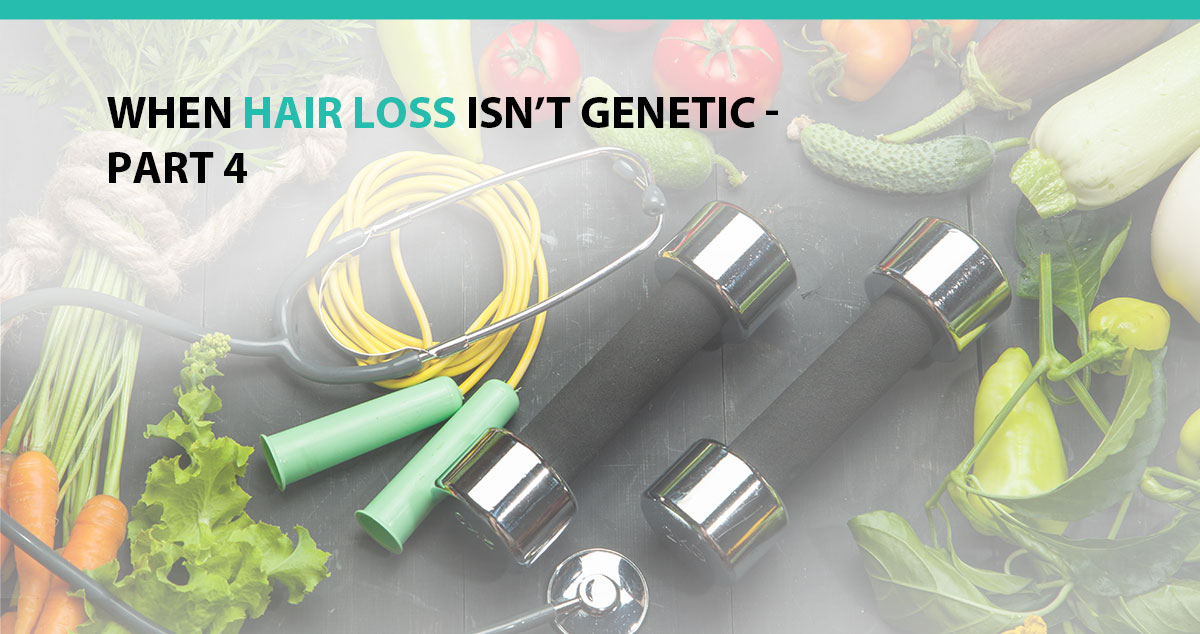
There are many reasons why we experience hair loss. As mentioned before, genetics is far and away the biggest reason. But since everyone doesn’t fall under that umbrella, it’s definitely worth looking into those less common causes.
See here for the first, second, and third articles in this series.
How does weight come into play when it comes to hair loss? On one side of the coin is obesity and its direct and indirect participation. On the other side of the coin is rapid weight loss or even malnutrition.
Obesity
As you grow older, your body’s metabolism slows down. It’s easy to gain weight if you don’t take deliberate steps to follow a healthy lifestyle. Your ideal weight takes into account factors such as height, age, build, and gender.
Adopting a healthy diet is the most effective way of achieving a suitable BMI range. It might also reverse hair loss by improving blood circulation and treating some conditions associated with obesity. Avoiding foods rich in sugar and saturated fats is a great start.
A hair-healthy diet contains a variety of nutrients. They include Omega-3 fatty acids, Vitamin C, iron, biotin, zinc, and lean protein. Examples of these foods are fish, vegetables, seeds, and chicke
You can also tackle obesity through physical fitness. It’s advisable to start with manageable exercises such as walking and cycling, then graduate to weight training and intense cardio as your body builds resistance.
While obesity is not a direct cause of hair loss, it contributes through the following associated conditions:
Diabetes
This illness adversely affects your circulatory system, which contributes to improper blood flow. This disruption also interrupts your hair growth cycle because your follicles depend on efficient blood flow to deliver nutrients. Most patients with Type 2 Diabetes live with the condition for years without knowing.
Fortunately, it’s possible to reverse the symptoms once it’s identified via a routine blood test. Other than medication, you can adopt a healthy diet and make other appropriate lifestyle changes.
Hormonal Imbalance
Some conditions, such as hormone imbalance, require a medical solution. We recommend seeing a qualified physician who can pinpoint the exact cause of your weight gain. That way, you can take specific measures to improve your physical and mental well-being, as well as your hair health.
Heart Disease
According to one scientific study, bald men have a higher chance of developing heart disease. It’s also a comorbid condition of obesity. Medical practitioners also consider hair loss as a visual sign of heart problems. There is a logical link because a weak heart causes poor blood circulation, which disrupts the growth of hair follicles.
A conclusive diagnosis of heart disease involves reviewing your patient history and performing a physical exam. You may also need imaging and blood tests. Depending on the extent of the disease, it can be treatable through lifestyle changes and medication.
Stress and Mental Disorders
Research is still ongoing regarding whether obesity causes depression or vice versa. Studies show that mental disorders are more prevalent in overweight patients compared to those with a healthy weight.
Stress is also known to play a role in at least three types of hair loss. They include alopecia areata, telogen effluvium, and trichotillomania. Although stress and depression are two separate disorders, prolonged stress can lead to depression.
Severe stress can trigger a type of hair loss called telogen effluvium, where more hair follicles enter the resting phase of the hair growth cycle prematurely, leading to increased hair shedding. This condition is usually reversible once the underlying stress is addressed. Severe stress can also trigger Trichotillomania, which is a psychological disorder characterized by the urge to pull out one’s own hair, leading to hair loss.
Rapid Weight Loss and Malnutrition
Hair loss during weight loss results mainly from telogen effluvium. This condition can be triggered by the emotional and physical stress associated with dieting and other weight loss techniques. The following tips will help you avoid it:
- Ensure your diet has sufficient calories. While most dieting solutions restrict calorie intake, your body needs the energy to facilitate hair growth.
- Eat enough proteins, which play a central role in hair formation. A food calculator will help you determine the exact amount you need to maintain your preferred weight and hair health.
- Integrate vegetables, whole grains, and fruits into your healthy diet. The iron in whole grains helps with hair growth, as well as zinc and various vitamins in fruits and vegetables.
- Incorporate multivitamins and other nutritional supplements into your weight loss program.
Unfortunately, no amount of fitness, nutrition, or hair care will protect your hair if you have all the genetic factors for male pattern baldness. But that doesn’t mean you are without options. Modern hair restoration is extremely advanced. A hair transplant can correct hair loss in as little as one visit.
Schedule a consultation with Dr. Joseph Williams for a comprehensive evaluation and tailor-made solutions. His advanced methods will ensure you receive a natural, thriving hairline whether or not weight plays a role in your hair loss.










